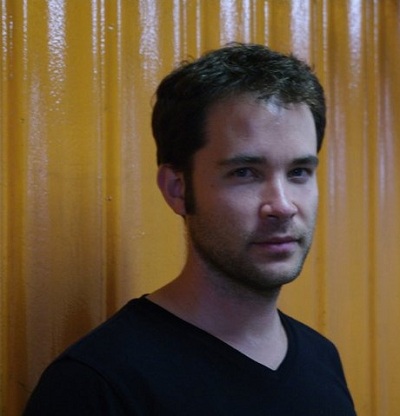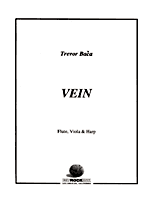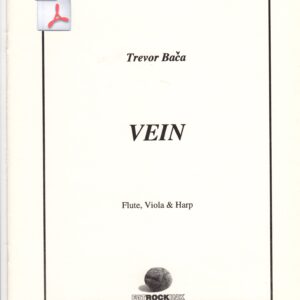Trevor Bača (*1975) grew up in Texas. His concerns as a composer include lost and secret texts; broken and dismembered systems; sorcery, divination and magic; and the effects, action and beauty of light. Bača’s music has been played throughout the world, with recent performances in Barcelona, Berlin, Boston, Cologne, Curitiba, Darmstadt, Huddersfield, Ljubljana, Lyon, Maastricht, New York, San Diego, Thessaloniki, Tokyo, Trieste, Würzburg and elsewhere.
Bača’s music has been played by soloists and ensembles around the world, including
the Argento Ensemble (New York); the Callithumpian Consort (Boston); the Debussy Trio (Los Angeles); Distractfold (Manchester); Either/Or (New York); Ensemble Dal Niente (Chicago); Ensemble Echoi (San Diego); Ensemble Mosaik (Berlin); ensemble recherche (Freiburg); Ensemble SurPlus (Freiburg); the JACK Quartet (New York); manufaktur für aktuelle musik (Cologne); Talea Ensemble (New York); and others.
Bača’s music has been programmed as part of the Darmstädter Ferienkruse (Darmstadt); Musica Sacra (Maastricht); the Weimarer Frühjahrstage für zeitgenössische Musik (Weimar); and elsewhere. Prizes include Harvard University’s George Arthur Knight Prize (2016); the Harry & Alice Eiler Foundation’s Ježek Prize in Composition (2008); and the Debussy Trio’s Susan & David Hirsch Prize in Composition (1996).
Bača’s music has been anthologized as part of Notations 21 (edited by Theresa Sauer) and Bača’s scores have been exhibited as art at the Chelsea Gallery in New York City and at the Hutchins Gallery on Long Island. Bača has lectured at universities and conservatories in many countries, including the Chinese University of Hong Kong; Columbia University; the Conservatoire Nationale Supérieur de Musique et Danse in Lyon; Eastman Conservatory; Harvard University; the Institut de Recherche et Coordination Acoustique / Musique (IRCAM) in Paris; the Massachusetts Institute of Technology (MIT); New England Conservatory (NEC); Northeastern University; Stanford University; the University of California at San Diego (UCSD); University College Cork in Ireland (UCC); and the Stuttgart Musikhochschule.
Bača holds a PhD in music composition from Harvard University.
Artist’s statement:
I understand my own music as a type emotive encoding. I write because I feel an emotional compulsion to write — to give form to fantastic or impossible colors and shapes as sound and as pleasure — and, yet, when I write, I am intensely aware of the fact that I am setting up and taking apart a code. I write for different combinations of instruments in chamber and orchestral settings and the written score is an important part of how I work. The act of score preparation is, for me, an emotional effort deeply concerned with the weight and energy and physical charge of raw and vibrant sounds, and, in equal measure, a type of work that is surpassingly symbolic, intimately bound up with the networks of potential meaning set up by marks on the page. I reject any dichotomy that pits the analytic against the emotional. Symbols can, and do, cut like knives. And I work for a music that is everywhere an emotional play of symbols, complete with all the almost unworkable contradictions such a play of symbols carries.
I don’t understand either the societal or psychological parts of the composer role. And I would just as soon replace it with some other type of work carrying some other type of baggage. Sorcery, perhaps. A special appeal to concentration, with concern for a secret language of symbols, a secret way of reading the events and details of the natural world. I want music to be an intensely shared and public experience. And I want the intensity of that experience to result, at least in part, from an effort of decipherment, and translation, on all our parts.
My music comes back again and again to a constellation of images, and desire. The beauty of reflected and refracted light. The relationships between code and power and time. The assertion of power and importance in an everyday type of living. The delicacy of flowers and their parts. And networks of people and our relationships. I believe that there is something utterly human in rendering flashes of these ideas as symbols on the page, designed specifically for experience in some other, potentially unknown, place.
— Trevor Bača

Trevor Bača (*1975) grew up in Texas. His concerns as a composer include lost and secret texts; broken and dismembered systems; sorcery, divination and magic; and the effects, action and beauty of light. Bača’s music has been played throughout the world, with recent performances in Barcelona, Berlin, Boston, Cologne, Curitiba, Darmstadt, Huddersfield, Ljubljana, Lyon, Maastricht, New York, San Diego, Thessaloniki, Tokyo, Trieste, Würzburg and elsewhere.
Bača’s music has been played by soloists and ensembles around the world, including
the Argento Ensemble (New York); the Callithumpian Consort (Boston); the Debussy Trio (Los Angeles); Distractfold (Manchester); Either/Or (New York); Ensemble Dal Niente (Chicago); Ensemble Echoi (San Diego); Ensemble Mosaik (Berlin); ensemble recherche (Freiburg); Ensemble SurPlus (Freiburg); the JACK Quartet (New York); manufaktur für aktuelle musik (Cologne); Talea Ensemble (New York); and others.
Bača’s music has been programmed as part of the Darmstädter Ferienkruse (Darmstadt); Musica Sacra (Maastricht); the Weimarer Frühjahrstage für zeitgenössische Musik (Weimar); and elsewhere. Prizes include Harvard University’s George Arthur Knight Prize (2016); the Harry & Alice Eiler Foundation’s Ježek Prize in Composition (2008); and the Debussy Trio’s Susan & David Hirsch Prize in Composition (1996).
Bača’s music has been anthologized as part of Notations 21 (edited by Theresa Sauer) and Bača’s scores have been exhibited as art at the Chelsea Gallery in New York City and at the Hutchins Gallery on Long Island. Bača has lectured at universities and conservatories in many countries, including the Chinese University of Hong Kong; Columbia University; the Conservatoire Nationale Supérieur de Musique et Danse in Lyon; Eastman Conservatory; Harvard University; the Institut de Recherche et Coordination Acoustique / Musique (IRCAM) in Paris; the Massachusetts Institute of Technology (MIT); New England Conservatory (NEC); Northeastern University; Stanford University; the University of California at San Diego (UCSD); University College Cork in Ireland (UCC); and the Stuttgart Musikhochschule.
Bača holds a PhD in music composition from Harvard University.
Artist’s statement:
I understand my own music as a type emotive encoding. I write because I feel an emotional compulsion to write — to give form to fantastic or impossible colors and shapes as sound and as pleasure — and, yet, when I write, I am intensely aware of the fact that I am setting up and taking apart a code. I write for different combinations of instruments in chamber and orchestral settings and the written score is an important part of how I work. The act of score preparation is, for me, an emotional effort deeply concerned with the weight and energy and physical charge of raw and vibrant sounds, and, in equal measure, a type of work that is surpassingly symbolic, intimately bound up with the networks of potential meaning set up by marks on the page. I reject any dichotomy that pits the analytic against the emotional. Symbols can, and do, cut like knives. And I work for a music that is everywhere an emotional play of symbols, complete with all the almost unworkable contradictions such a play of symbols carries.
I don’t understand either the societal or psychological parts of the composer role. And I would just as soon replace it with some other type of work carrying some other type of baggage. Sorcery, perhaps. A special appeal to concentration, with concern for a secret language of symbols, a secret way of reading the events and details of the natural world. I want music to be an intensely shared and public experience. And I want the intensity of that experience to result, at least in part, from an effort of decipherment, and translation, on all our parts.
My music comes back again and again to a constellation of images, and desire. The beauty of reflected and refracted light. The relationships between code and power and time. The assertion of power and importance in an everyday type of living. The delicacy of flowers and their parts. And networks of people and our relationships. I believe that there is something utterly human in rendering flashes of these ideas as symbols on the page, designed specifically for experience in some other, potentially unknown, place.
— Trevor Bača
Showing all 2 results


